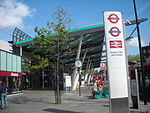Finsbury Park Mosque
1990 establishments in EnglandInfobox religious building with unknown affiliationIslamic organizations established in 1990Mosque-related controversies in EuropeMosques completed in 1994 ... and 3 more
Mosques in LondonReligion in the London Borough of IslingtonUse British English from March 2019

The Finsbury Park Mosque, also known as the North London Central Mosque, is a five-storey mosque located next to Finsbury Park station close to Arsenal Football Club's Emirates Stadium, in the London Borough of Islington. Finsbury Park Mosque is registered as a charity in England, serving the local community in Islington and the surrounding boroughs of North London.The mosque gained national attention when Abu Hamza al-Masri, a radical preacher, became its imam in 1997. In 2003, the mosque was closed by its trustees following an anti-terrorist police raid, and re-opened in 2005 under new leadership.
Excerpt from the Wikipedia article Finsbury Park Mosque (License: CC BY-SA 3.0, Authors, Images).Finsbury Park Mosque
Saint Thomas's Road, London Finsbury Park (London Borough of Islington)
Geographical coordinates (GPS) Address External links Nearby Places Show on map
Geographical coordinates (GPS)
| Latitude | Longitude |
|---|---|
| N 51.5636 ° | E -0.1057 ° |
Address
Finsbury Park Mosque
Saint Thomas's Road 7-11
N4 2QH London, Finsbury Park (London Borough of Islington)
England, United Kingdom
Open on Google Maps









